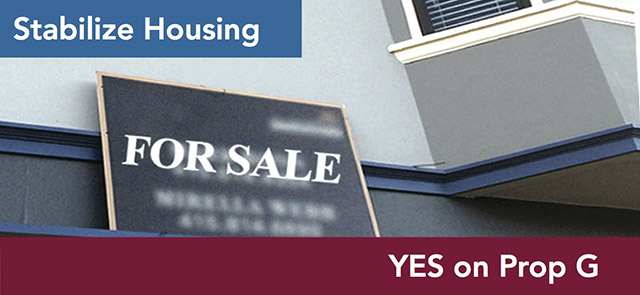 With the November 4th election right around the corner, it’s time for MEDA to advise of its stances on ballot measures as they pertain to the nonprofit’s mission of asset building for its low- and moderate-income clients, who are predominately Latino.
With the November 4th election right around the corner, it’s time for MEDA to advise of its stances on ballot measures as they pertain to the nonprofit’s mission of asset building for its low- and moderate-income clients, who are predominately Latino.
Ballot Measure: Prop G
MEDA Says: Yes on Prop G
The essentials
The gist of Prop G is the imposition of a graduated real estate transfer tax on short-term property flips of multi-unit buildings when a profit is made from the sale. The anti-speculation tax starts at 24% if the property is resold within Year One of ownership, with a two percent decrease each year, equating to a 14 percent tax if sold in Year Five. There would be no additional tax after Year Five.
Important to note is that this ballot measure explicitly exempts the following: single-family homes and condos; any owner-occupied home, including tenancies-in-common (TIC’s); and any new housing built, including new or legalized in-law units.
It is also important to note that this is not a new tax on any current San Francisco property owner.
MEDA’s reasoning
MEDA’s mission of social economic justice for its over 5,000 clients is presented with a major obstacle: lack of stable housing. Asset building starts with security of shelter.
This was epitomized by a March event at one of the four Mission Promise Neighborhood schools. MEDA and its community partners held this Bryant Housing Town Hall, with conversations being had in kitchens across the Mission brought into the public realm, empathy about the fear of displacement the common ingredient.
The Mission District has been most affected by Ellis Act evictions, with 71 such displacements in 2009-13–and with Latinos disproportionately forced out of their residences. The Ellis Act is a three-decades-old California law that grants landlords a statutory right to exit the rental housing business. (The bill was intended to protect landlords, not speculators.)
The Mission is primarily a neighborhood of renters. When complemented by the Mission having some of the oldest housing stock in San Francisco—meaning it is an area exhibiting myriad rent-controlled units—speculators have swarmed the area to flip properties. A domino effect is occurring, with circles of affluence making for a peripheral price rise in the Mission.
This is evidenced by the San Francisco Planning Department’s counterintuitive statistic that the Mission actually decreased in population by 3,184 from 2000-2012, despite an increase of 31,022 new residents coming to town in the same time period. These numbers seem juxtaposed to a housing crunch, until you factor in that families are being displaced by young singles, the latter with higher incomes. (The San Francisco Planning Department shows median household income was $50,676 in 2000, only two-thirds of the citywide number; that number for 2012 had skyrocketed to $75,269, now higher than the citywide figure.)
According to stats compiled by Tenants Together and the Anti-Eviction Mapping Project, 78 percent of Ellis Act evictions occur in the first five years of ownership, with 51 percent in the first year. Also of note is that 30 percent of Ellis Act evictions in San Francisco are done by a small group of people, termed “serial speculators.”
While new affordable housing being built in the Mission is definitely needed, a triage approach for the preservation of existing housing needs immediate implementation. Prop G is a vital part of that equation.
MEDA stands by valued community organizations dedicated to stabilizing the Mission’s housing stock: Causa Justa :: Just Cause; Chinatown Community Development Center (CCDC); Council of Community Housing Organizations (CCHO); People Organizing to Demand Environmental & Economic Rights (PODER); the San Francisco Anti-Displacement Coalition; and Tenants Together.
Political background
With the short-but-sweet moniker of “Stop the Flip,” the genesis of this measure came out of a community planning process held by the San Francisco Anti-Displacement Coalition, formed last year to address the wave of evictions and landlord harassment of tenants in San Francisco.
Prop G was inspired by the late Supervisor Harvey Milk’s proposed legislation to stabilize housing way back in 1978.
Last spring, MEDA Policy Manager Gabriel Medina lobbied in the capital for the passage of SB 1439, which attempted to circumvent the state’s Ellis Act law within the limits of the City and County of San Francisco. That legislation had called for a term of five years being mandated before any property could be sold if the owner was requesting an Ellis Act eviction.
This bill ultimately failed, leading to MEDA now pushing for the passage of Prop G on the local level.
MEDA Executive Director Luis Granados recently met with San Francisco Mayor Ed Lee to underscore the nonprofit’s backing of Prop G. Lee has yet to take a stance on this anti-speculation measure.
Conclusion
To ease real estate speculation in San Francisco, MEDA urges the entire San Francisco community to say, “Yes on Prop G!”





